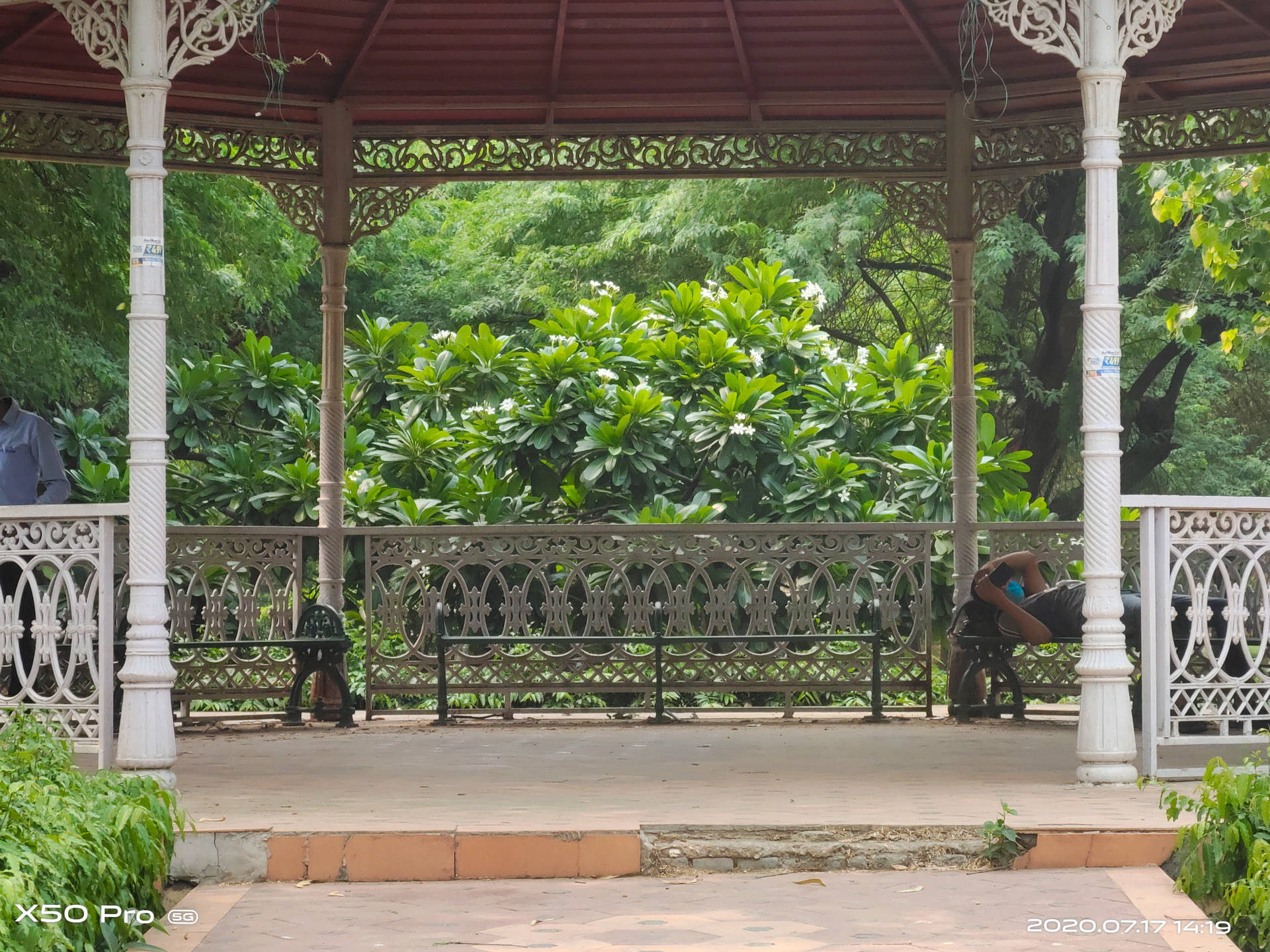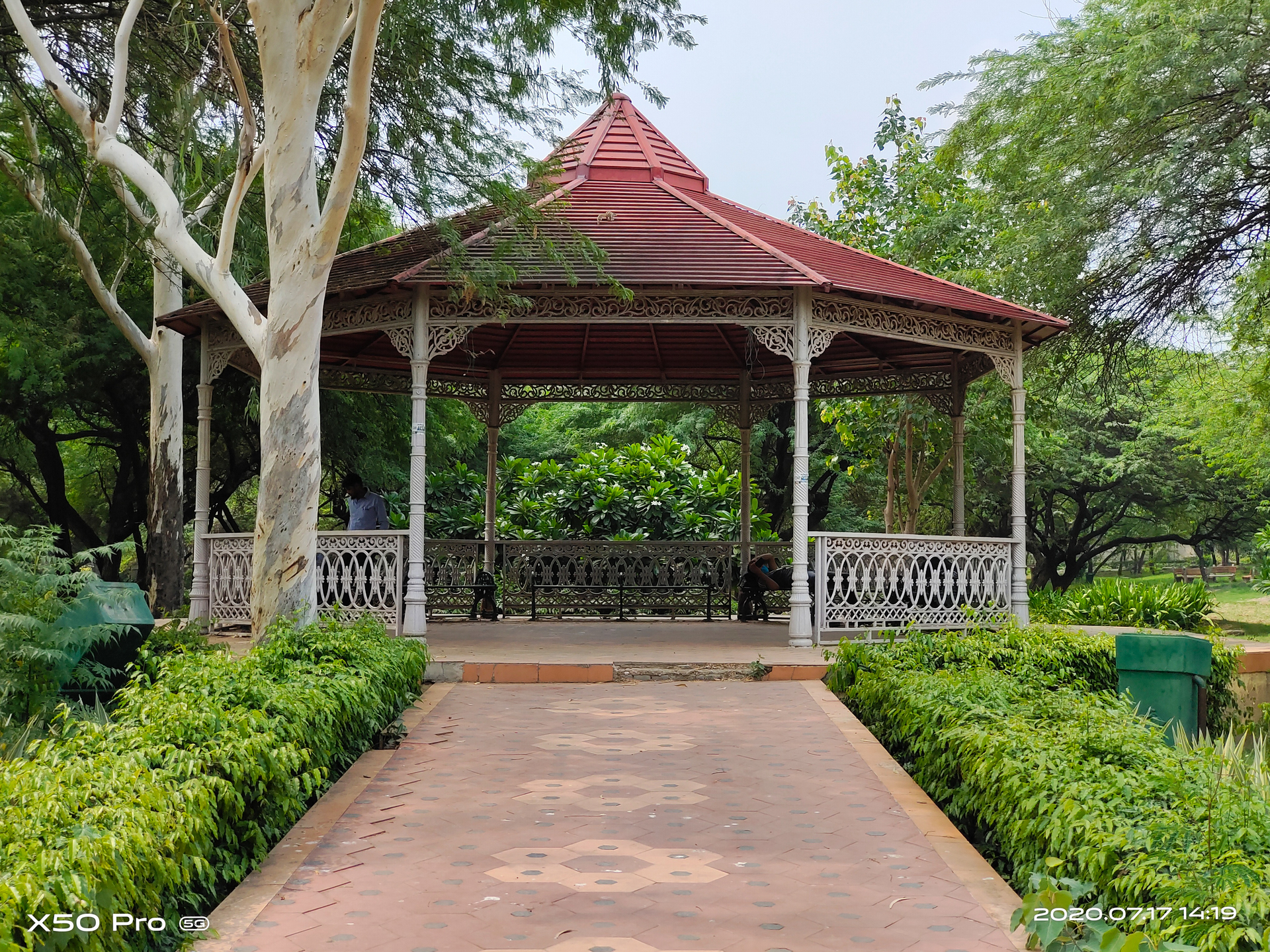A key tenet of the modern day smartphone is imaging prowess. Be it larger sensors or innovative new ways to optimize for less than perfect lighting, it is incredible to see how far smartphone photography has come in the last few years. With the Vivo X50 Pro, the company is showcasing yet another technique to improve low-light imaging and video quality.
With abundant processing power available in the mid-segment, Vivo mixed a 5G-capable chipset with high-end imaging chops. Does it deliver? We find out in the Android Authority Vivo X50 Pro review.
Vivo X50 Pro review: Design and display
- Glass back, aluminum frame
- In-display fingerprint reader
- 158.5 x 72.8 x 8mm
- 181g
- 6.56-inch Full HD+ AMOLED display
- 90Hz
- Tempered glass

Photographs really don’t do the Vivo X50 Pro justice. A few years back, I wouldn’t have imagined myself saying that Vivo could make one of the best looking phones of the year, but the build quality belies the price. From the in-hand feel to the utterly luxurious finish on the back panel, the X50 Pro oozes style and is nothing short of premium.
The glass sandwich design has become the de-facto choice for smartphones, but that doesn’t mean they’re all the same. Vivo opted for a satin-soft finish on the frosted glass back that feels familiar yet refreshing. In fact, it reminds me of the pearlescent white finish on the OnePlus 6.
An added advantage of the soft finish is that it doesn’t surface fingerprints and smudges easily. Win-win.

While the two-step camera module is on the larger side owing to the nature of the assembly, the phone retains slim and svelte dimensions all the way around. The camera module caught on to the pocket of my jeans a couple of times, but it’s not a major concern. My wrists definitely appreciated the light 181g weight of the phone.



The frame of the phone is made from aluminum with the power key and volume rocker on the right side of the phone. Once again, the fit and finish here is absolutely top notch and the buttons have just the right amount of feedback. The rest of the port arrangement is what you’d expect. There’s a standard USB-C port along the bottom edge next to the speakerphone grille. No, there’s no headphone jack here.

The 6.56-inch Full HD+ OLED display has slim bezels on all sides and a punch hole for the front-facing camera. The 90Hz panel ensures that UI navigation is nice and smooth. The phone lets you alternate between 60Hz and 90Hz as well as an adaptive mode that smartly switches between the two profiles. The X50 Pro sports Schott’s tempered glass for protection against scratches and drops.
The HDR10+ capable display is excellent to look at, but peak brightness levels could be better.
The display on the Vivo X50 Pro is an excellent HDR10+ capable panel that switches between the DCI-P3 and SRGB profile depending on the mode you select. Color accuracy is decent, but the panel errs towards cooler tones. This can be corrected using the toggle switch in the settings menu.
I clocked brightness levels at about 438nits, which certainly isn’t best in class. In real-world use, however, the display was perfectly visible outdoors and I didn’t face any issues.

All in all, Vivo has done a brilliant job with the hardware on the X50 Pro. The phone looks and feels premium, demonstrates excellent weight distribution and couples that with a high-quality display. My only gripe is the lack of an IP rating, which is an unfortunate omission at this price point.
Performance: No complaints
- Qualcomm Snapdragon 765G
- 1 x 2.5GHz Kryo 475 Prime, 1 x 2.2GHz Kryo 475 Gold and 6 x 1.8GHz Kryo 475 Silver
- Adreno 620
- 8GB RAM
- 256GB storage
The Vivo X50 Pro is powered by a Snapdragon 765G chipset. or the most part, I had no issues at all with the mid-range chipset. I get the argument for a top-range processor, but unless you spend a lot of time gaming, the performance advantage is lost on most users.
Read more: Qualcomm’s Snapdragon 765 and 7c chipsets are bigger deals than you might think
If choosing a mid-range processor is what allowed Vivo to cram in extra features like the gimbal camera, I’ll take the potential performance hit.
Performance out of the box is plenty for most users, but future-proofing might be a concern.
Talking about performance, real-world usage showed no hiccups at all. The phone was perfectly slick during my time with it. Funtouch OS flies on the phone and the company did an excellent job mating the software to the hardware. The Vivo X50 Pro can comfortably handle any game you throw at it.
If you tend to hold on to your phone for a couple of years and future-proofing is a concern, you might want to look at something with a bit more grunt under the hood. For everyone else, there really shouldn’t be a concern.



I ran a range of benchmarks to evaluate the performance of the Vivo X50 Pro and they back up what you’d expect. The Snapdragon 765G is a perfectly adequate mid-range performer that should suffice for most people.
Battery: All day longevity
- 4,315mAh
- 33W
- No wireless charging
Owing to the large battery capacity and a fairly frugal chipset, battery life on the Vivo X50 Pro is exceptional. I regularly clocked over seven hours of screen-on time, which is more than sufficient for practically anyone.
I use a whole lot of Slack, Twitter, and Instagram, and made phone calls and yet I was never able to drain the phone over a full day of use. Great!
The mid-range chipset and large battery combine to offer all-day life with enough juice to last you well into the night.
The phone charges speedily too. It took the included 33W charger just 73 minutes to top off the phone. A 15-minute charge nets you 30% battery life.
Software: Funtouch is growing up
- Android 10
- Ample bloatware
- Jovi Search is irritating
On one hand, it is admirable to see Vivo taking consumer feedback seriously and tone down Funtouch OS, yet it still isn’t quite the ideal user experience. Don’t get me wrong, Vivo has done a great job at adding meaningful features. Yes, Funtouch finally has an app drawer and icons are now consistent.



There are ample customization options. From the theme to icons, always-on display, and more, Funtouch OS lets you truly make your phone your own. However, the amount of bloatware on the phone is off-putting and not all of it can be removed. There’s also the matter of the integrated global search. I can see the utility in it, but it tosses in content and search suggestions that have no relevance to what you might actually be searching for on your phone.
Global search on the Vivo X50 Pro takes over the default pull-down gesture and gets irritating real quick.
It is easy enough to switch these off, but I’d really like to replace the swipe down gesture to the standard notification shade instead of Vivo’s search application. You listening, Vivo?
Camera: Gimbal power
- 48MP, f/1.6, primary sensor
- 8MP, f/2.2, 120-degree ultra-wide sensor
- 13MP, f/2.5, 2x telephoto portrait lens
- 8MP, f/3.4, 5x telephoto lens
- 32MP selfie camera
- 4K 60fps video recording
- Micro-gimbal stabilization

There’s a lot going on with the cameras on the Vivo X50 Pro and the quad-camera setup is interesting to say the least. The primary shooter sports a unique gimbal system that shifts the lens along two axis using electromagnetic induction. The entire assembly is five times the size of a standard OIS module and offers a degree of stabilization that is hard to find on competing hardware.

The primary sensor is a 48MP Sony IMX598 that shoots good-looking shots outdoors. It’s sharp and noise levels are fairly under control. Colors are sometimes over-saturation but there’s good dynamic range.
While I’m not a huge fan of boosted saturation, I enjoyed using the camera on the Vivo X50 Pro for the consistently good output.

I wasn’t too enthused by the images from the ultra-wide camera on the Vivo X50 Pro. The 8MP sensor doesn’t resolve much detail, but the distortion correction does a passable job.
I like the fact that Vivo kept a consistent color presentation across the lenses. However, that means you still get the boosted saturation levels like the primary sensor.
 Vivo X50 Pro 2x gazebo Vivo X50 Pro periscope zoom
Vivo X50 Pro 2x gazebo Vivo X50 Pro periscope zoom

Interestingly, the Vivo X50 Pro ships with two telephoto lenses. There’s a 2x zoom lens, and while it’s meant for capturing portrait images, it works just as well for zooming into an object. There’s also a dedicated 5x telephoto zoom lens.
Images from the portrait lens are more than serviceable, with accurate color and a contrast-rich tuning. The camera doesn’t do too good a job at resolving details, but you won’t have a problem here unless you decide to crop in even further.
Meanwhile, the 5x telephoto lens takes passable shots. I found images to be ever-so-slightly washed out. There’s a decent amount of detail, but I found the camera often overexposed the image, which can result in burnt-out highlights.

While the phone lacks a dedicated macro camera, it does have a built-in macro mode. It utilizes the ultra-wide sensor to crop in and capture a close-up shot. Since the camera module is capable of focusing as close as 2.5cm even when not using macro mode, do yourself a favor and ignore macro mode. The built-in mode crops in from the ultra-wide camera and then upscales the resolution giving you a lower quality shot. You’re better off with the whole frame.
 Vivo X50 Pro standard selfie Vivo X50 Pro portrait selfie
Vivo X50 Pro standard selfie Vivo X50 Pro portrait selfie

The selfie camera takes passable images with limited dynamic range and limited detail. The portrait selfie mode does the usual assortment of skin enhancement, sharpening, and adds a bokeh effect to create a more visually appealing image. It does the trick if that’s what you’re into.
Low-light imaging on the Vivo X50 Pro, especially with night mode activated, is simply incredible. The gimbal system lets you use shutter speeds as low as one-eighth of a second and still gets usable images. Pictures are bright, noise-free for the most part, and generally excellent. Night image mode on the ultra-wide camera offers up passable images, but I wouldn’t recommend using it. You cannot use night mode on the telephoto lenses.
You can take a look at high-resolution image samples from the Vivo X50 Pro here.
Video quality on the X50 Pro is exemplary when captured at 4K 60fps. The gimbal stabilization works beautifully and helps you get absolutely stable footage even with significant movement.
Video quality on the X50 Pro is great with some of the most stable output I've seen from a phone.
Things get a bit soft at 4K 30fps since the camera uses electronic image stabilization by cropping into the frame and upscaling to 4K. The secondary cameras can only shoot at 1080p 30fps, unfortunately.

Vivo made some nifty additions to the camera software. You can activate a gimbal radar tool that serves as a visual indicator for positioning of the gimbal. Center the ball and you’ll know that the gimbal is perfectly stabilized.
Audio
- Single loudspeaker
- No headphone jack
- DAC
I wasn’t particularly excited by the speaker on the Vivo X50 Pro. It gets loud and is serviceable for listening to podcasts and YouTube videos, but don’t expect high-quality output.
The phone doesn’t have a headphone jack, but the AK4337A DAC chip should give you better quality output when using a USB-C-to-3.5mm adaptor with high-end headphones. You might not notice much of a difference in audio quality with more run-of-the-mill headphones. USB-C headphones typically have their own DAC, so the effect may not be a pronounced with those.
On the wireless audio side of things, the phone supports the full range of aptX codecs and can output for LDAC as well for lossless audio listening on the go.
Vivo X50 Pro review: Specs
| Oppo Reno 4 Pro | |
|---|---|
| Display | 6.56-inch Dynamic Super AMOLED 2376 x 1,080 resolution 90Hz |
| Processor | Qualcomm Snapdragon 765G |
| RAM | 8GB |
| Storage | 256GB |
| Battery | 4,315mAh 33W |
| Cameras | Rear: Quad camera setup: 48MP (IMX598+Gimbal)+8MP(ultra wide angle) + 13MP(2 x telephoto) + 8MP (5 x telephoto) Front: 32MP |
| IP rating | No |
| Headphone jack | No |
| Security | In-display fingerprint sensor |
| Software | Funtouch 10.5 Android 10 |
| Dimensions and weight | 158.5 x 72.8 x 8 mm 181g |
| Colors | Dark Blue, Light Blue |
Value for money
- Vivo X50 Pro: 8GB RAM, 256GB Storage — Rs. 49,990 (~$667)
By performance metrics, the Vivo X50 Pro certainly isn’t best in class. It is possible to get Snapdragon 865 smartphones for less money, and avid gamers will likely flock to those. However, for the general smartphone user, there’s a lot to like here. The build quality and camera system, in particular, should be a good enough reason to opt for the Vivo X50 Pro if all you need is a solid device that can take good photographs in a jiffy.
Alternatives include the OnePlus 8 and the Mi 10. The OnePlus 8 is a bit of a downgrade on the imaging side, but makes up for it with a much faster processor. It certainly helps that the phone is even more affordable at just Rs. 41,999 (~$561).
Another excellent alternative is the Xiaomi Mi 10. Packing a Snapdragon 865, it takes things further with an excellent 108MP primary camera, though the additional sensors are a bit lackluster. It even includes fast wireless charging making it at an excellent deal at Rs. 49,999 (~$668).
Vivo X50 Pro review: Should you buy it?
The Vivo X50 Pro is a spectacular looking phone that strikes a good balance between power and everything that matters to an end-user. It’s not really meant for someone who cares about absolute speed. Instead, the luxurious build, the innovative gimbal camera system paired with a good primary camera, and the long battery life are what make the phone shine.
Funtouch OS has come a long way. However, despite all its optimization, the included bloatware and extraneous search tool prevent me from making an all-out recommendation. Most of the bloat can be removed, but I’d much rather have a lighter out-of-the-box experience.
If you don’t mind dealing with Funtouch OS, the Vivo X50 Pro is one to consider for someone who needs a reliable, all-day, general use device with a great primary camera.
from Android Authority https://ift.tt/2YbXZG4
No comments:
Post a Comment